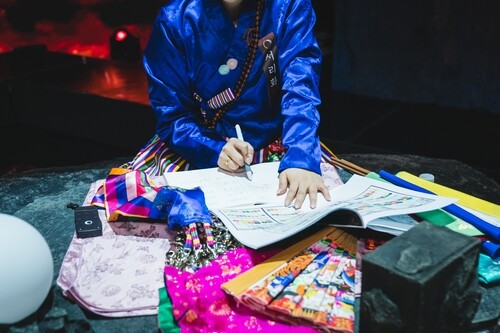(News Focus) Harris-Trump-Policy
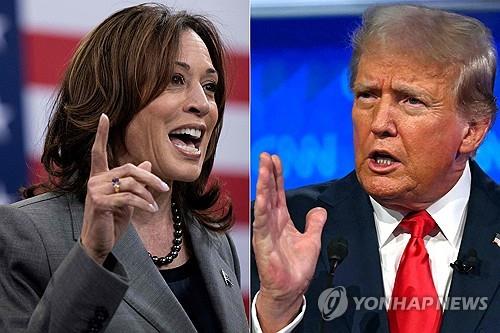 |
| ▲ This combined photo, released by AFP, shows Vice President Kamala Harris (L) and former President Donald Trump. (Yonhap) |
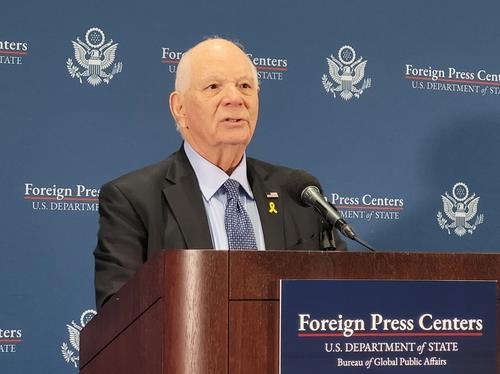 |
| ▲ Sen. Ben Cardin of Maryland, the chair of the Senate Foreign Relations Committee, speaks during a press briefing organized by the Foreign Press Centers in Chicago on Aug. 22, 2024. (Yonhap) |
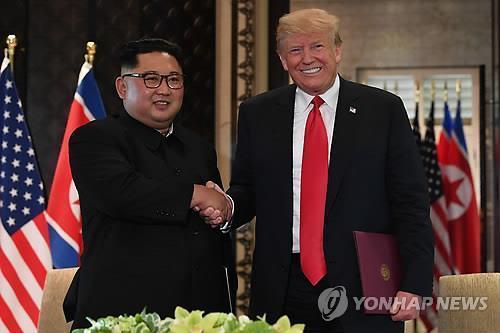 |
| ▲ This AFP photo shows then U.S. President Donald Trump (R) shaking hands with North Korean leader Kim Jong-un after signing a joint statement at the Capella Hotel on Sentosa Island in Singapore on June 12, 2018. (Yonhap) |
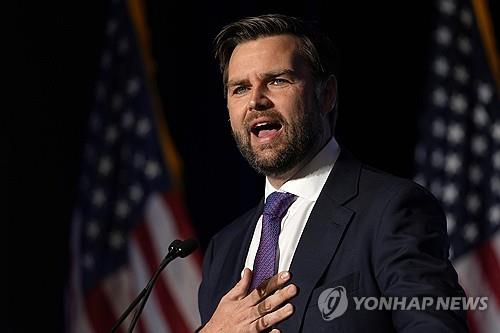 |
| ▲ Republican vice presidential candidate Sen. J.D. Vance speaks during Faith & Freedom Coalition's God & Country Breakfast, on July 18, 2024, in Milwaukee, Wisconsin in this photo released by the Associated Press. (Yonhap) |
(News Focus) Harris-Trump-Policy
(News Focus) Harris, Trump seen envisioning different approaches to alliances, N.K. threats
By Song Sang-ho
WASHINGTON, Aug. 22 (Yonhap) -- With the U.S. presidential election a little over 70 days away, global attention is shifting to how Democratic flag-bearer Kamala Harris and her Republican rival Donald Trump would deal with America's alliances, North Korean threats, strategic rivalry with China and other issues if elected.
Vice President Harris and former President Trump appear to be envisioning divergent approaches in many respects, drawing keen attention from South Korean policymakers as the outcome of the Nov. 5 election could affect the Seoul-Washington relationship and the allies' efforts to promote peace on the divided Korean Peninsula.
Officially feted as the Democratic nominee this week, Harris, if elected, is expected to build on President Joe Biden's approach to cement and leverage a network of America's allies and partners to confront global challenges, including the North Korean nuclear quandary, though she would put her own imprint on the U.S. policy tiller.
Formally crowned as the GOP standard-bearer last month, Trump looks set to double down on his "America first" credo seen as an approach to call for U.S. allies to do more to address shared security challenges while limiting America's burdensome involvement, if not entanglement, overseas.
When it comes to the North Korean conundrum, Harris might focus on collaborative efforts with allies to beef up deterrence, while Trump could seek a revival of his leader-to-leader engagement with North Korean leader Kim Jong-un given his oft-repeated boasts of personal ties with Kim.
The two candidates' respective parties have adopted their 2024 policy platforms that many said would set the tone for the nominees' policy visions.
The Democratic platform stressed that the United States will "stand by our allies, especially South Korea," against North Korea's provocations, while noting the role of stronger trilateral cooperation with Seoul and Tokyo to maintain peace and stability on the Korean Peninsula and beyond.
The platform was drawn up before Biden dropped out of the presidential race last month, but Harris' vision is expected to be largely in line with key tenets of that platform centering on bilateral, trilateral and multilateral cooperation with allies for regional and global security.
"I expect a Harris administration policy on the U.S.-ROK alliance and North Korea to be very similar to the Biden administration and Obama administration approaches. This means a strong emphasis on using alliances and a network of partners to advance a rules-based international order," Frank Aum, a senior expert at the United States Institute of Peace, told Yonhap News Agency via email. ROK stands for South Korea's official name, the Republic of Korea.
"On North Korea, I expect a Harris administration to continue a cautious, pressure-based approach that focuses on deterring North Korean aggression while also seeking engagement but without taking unconventional risks," he added.
Aum pointed out that without a willingness to take diplomatic risks or deviate significantly from a conventional approach to the North, the end result for any administration will be the "status quo where an isolated and insecure, but also nuclear, North Korea remains a threat to the United States, South Korea, and the international community."
Andrew Yeo, the SK-Korea Foundation Chair at the Brookings Institution's Center for Asia Policy Studies, anticipated that Harris will initially follow Biden's approach to the North -- remaining open to dialogue without preconditions, working with allies to bolster deterrence and reassuring allies of America's defense commitments.
But he also raised the prospect of Harris exploring creative ways to address North Korean challenges.
"If North Korea continues its provocations and rejects dialogue with the United States, Harris may have little choice but to continue along similar lines to Biden's current North Korea policy," Yeo said.
"However, because there has been little progress on engagement, Harris may also try to think outside of the box to break the impasse with North Korea."
While the Democratic platform underlined the importance of cooperation with allies, the omission of a pledge to pursue the goal of the Korean Peninsula's denuclearization has raised concerns in South Korea, with some speculating on a potential policy focus shift. The 2020 platform included a reference to the "longer-term goal of denuclearization."
On Tuesday, Colin Kahl, former undersecretary of defense for policy, dispelled those concerns, saying people appear to be "overreading" the platform. He was known to have participated in a project to write the party platform.
"Denuclearization of the Korean Peninsula remains an objective of this (Biden) administration and, I would have to imagine, a Harris-Walz administration," Kahl told a press briefing on the margins of the Democratic National Convention in Chicago.
Sen. Ben Cardin of Maryland, the chair of the Senate Foreign Relations Committee, echoed the view.
"That's always been our goal. We think they should be denuclearized," he said during a press briefing in Chicago on Thursday. "We believe that's an issue that has to be done."
Many expect that should Trump return to office, he would rekindle his personal diplomacy with Pyongyang. On the campaign trail, he has repeatedly flaunted his close ties with the North Korean leader in a sign of a desire for reengagement.
"I got along with him, and we stopped the missile launches from North Korea. Now, North Korea is acting up again, but when we get back, I get along with him," Trump said during his nomination acceptance speech at the Republican National Convention in Milwaukee, Wisconsin, last month.
"He'd like to see me back too. I think he misses me," he added.
Trump's direct diplomacy, should it occur, might raise questions over how he would coordinate with the Seoul government on the nuclear quandary -- a consequential, immediate security challenge for South Korea.
Some observers have raised concerns that apparent gaps in threat perceptions between Seoul and Washington, coupled with the possibility of insufficient coordination, could potentially lead to a cacophony in the alliance.
In particular, they raised speculation over the possibility of a deal between the U.S. and the North that would address only intercontinental ballistic missile threats rather than other shorter-range weapons systems that pose serious threats to Seoul.
But Trump's approach could have a silver lining as his unconventional approach could lead the reclusive leader in Pyongyang to at least return to dialogue as seen during his first term in office. Trump and Kim held three in-person summits, including their countries' first-ever summit in Singapore in 2018, though serious dialogue between the two sides stalled after the no-deal Hanoi summit in February 2019.
Diplomatic approaches aside, a more fundamental question arises of whether Pyongyang would ever accede to Washington's diplomatic feelers at a time when burgeoning cooperation with Moscow is helping address its economic, military and other needs not to mention China, another traditional partner for the North to fall back on.
Last month, the Republican Party adopted a new policy platform that falls in line with Trump's touted goal to "make America great again."
The platform called for U.S. allies to fulfill their obligations to invest in "common defense," reinforcing speculation that Trump, if reelected, could step up pressure on allies to make more contributions for their security.
"Republicans will strengthen alliances by ensuring that our allies must meet their obligations to invest in our common defense and by restoring peace to Europe," the platform read.
The two presidential rivals' policy visions for alliances are likely to be colored by their perspectives on them.
Harris is expected to largely inherit Biden's view of allies as America's great "strategic" asset and his efforts to build fit-for-purpose groupings, such as the trilateral partnership between Seoul, Washington and Tokyo, and the AUKUS security platform consisting of the U.S., Britain and Australia.
Uncertainty, however, lingers over the prospects of America's alliances given what is viewed as Trump's "transactional" approach toward allies and partners.
"Together, we will make sure our allies share in the burden of securing world peace," Sen. J.D. Vance of Ohio, Trump's vice presidential running mate, said last month. "No more free rides for nations that betray the generosity of the American taxpayer."
Regarding the strategic rivalry with China, both sides are expected to have a hard-line stance over security, trade and technological leadership. Trump's proposal for high tariff rates on Chinese imports could lead to another round of trade friction that could have broader geopolitical implications.
(END)
(C) Yonhap News Agency. All Rights Reserved




























![[게시판] 안무저작권협회, 국가대표 출신 선수 출연 토크콘서트](/news/data/20251118/yna1065624915929065_337_h2.jpg)




